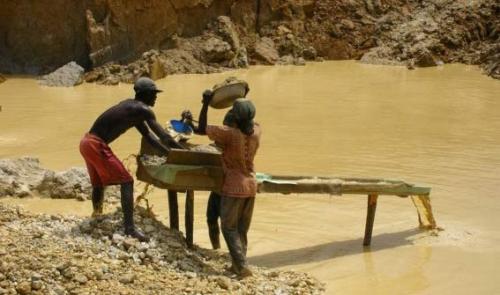Africa's natural resources can fuel economic transformation – UN report
Africa must tap into its agricultural, mining and energy resources to boost its economic growth, argues a new report released in Morocco Monday by the United Nations and its partners.

Gold miners in Ghana.
The African Economic Outlook 2013 states that African countries must take full advantage of their natural resource wealth to accelerate the pace of growth and ensure the process can benefit ordinary Africans. It also stresses that this must be accompanied by inclusive social policies that seek to reduce inequality in the continent.
“Now is the time to step up the tempo of economic transformation, so that African economies become more competitive and create more gainful jobs,” said the authors of the report, adding that “widening the sources of economic activity is fundamental to meeting this challenge.”
The report says the continent's economic prospects for 2013 and 2014 are promising, with the economy projected to grow by 4.8 per cent the first year and accelerate further to 5.3 per cent the next.
However, it emphasizes that economic growth alone will no be enough to reduce poverty, tackle persistent unemployment, and address income inequalities and deteriorating levels of health and education.
“Growth is not enough,” said Mario Pezzini, Director at the Organisation for Economic Co-operation and Development (OECD) Development Centre. “African countries must provide the right conditions for turning natural resources into jobs, optimise their resource revenues through smart taxation and help investors and locals to make the most of linkages.”
According to the report, four key elements are necessary for inclusive growth. These consist of: creating the right conditions for transformation including infrastructure and the creation of more competitive markets; implementing more effective tax systems as well as improving land management; ensuring proceeds from natural resources are invested in projects that benefit civil society; and actively fostering economic diversification.
“Ultimately, transformation means opening opportunities so people can find jobs, create businesses, as well as invest in health, education and food security. In turn, higher levels of human development for all, including the most vulnerable, can accelerate the pace of economic transformation, leading to a virtuous cycle of growth and development,” the UN Development Programme (UNDP) said in a news release.
The report is produced annually by the African Development Bank (AfDB), the Development Centre of the Organisation for Economic Cooperation and Development (OECD), the Economic Commission for Africa (ECA) and UNDP.
Source: UN News
- 379 reads
Human Rights
Fostering a More Humane World: The 28th Eurasian Economic Summi

Conscience, Hope, and Action: Keys to Global Peace and Sustainability

Ringing FOWPAL’s Peace Bell for the World:Nobel Peace Prize Laureates’ Visions and Actions

Protecting the World’s Cultural Diversity for a Sustainable Future

Puppet Show I International Friendship Day 2020

